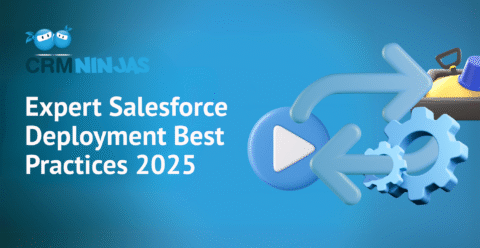CRMNinjas explores how Salesforce’s integrated tools Account Management (Pardot) and Marketing Cloud can transform and simplify your marketing operations
Are you wasting Salesforce potential? If the customer relationship management (CRM) platform isn’t a part of your marketing management strategy, you’re likely leaving untold amounts of efficiency and productivity on the table.
Marketing management and marketing operations based within the Salesforce ecosystem is a commonly untapped power that allows you to eliminate data silos and streamline your customers’ journeys for both in-house teams and agencies.
Instead of improvising with third-party marketing platforms, working within Salesforce and its integrated tools Account Engagement (Pardot) and Marketing Cloud enables your marketing operations to take advantage of:
- Seamless Integration
- Comprehensive Connected Marketing Automation
- Unified Customer View
- Enhanced Collaboration
- Scalability and Flexibility
In this article, CRMNinjas explains the basics of deploying Salesforce as a marketing management engine to work in tandem with your CRM and the Top five strategies for rapidly seeing it pay for itself.
Table of Contents
- Marketing Management within Salesforce
- Top Strategies to Integrate Salesforce in Marketing Management
- 1. Maintaining Clean and Accurate Data for Effective Marketing
- 2. Setting Clear Goals and Tracking Progress
- 3. Defining & Target Audiences With Advanced Segmentation
- 4. Leveraging Data to Improve Marketing Strategies and Content Creation
- 5. Generate High-Impact, Personalized Content With Dynamic and Merge Fields
- Fully Embrace Salesforce in Marketing Management with CRMNinjas
- Frequently Asked Questions
Get Serious with Salesforce with CRMNinjas
CRMNinjas is a certified Salesforce admin-as-a-service partner. Our specialists fully deploy, customize, design and implement Salesforce features for businesses and take over day-to-day platform management and user training.
Want to learn more? Connect with us for a free Salesforce audit.
Marketing Management within Salesforce
With Salesforce, there is a suite of features and additional add-on tools to transform your marketing strategy.
Can you use Salesforce itself as a marketing tool? Absolutely. However, there will be opportunity costs in efficiency and potential business growth.
Salesforce has basic native marketing features, specifically its email platform. Within the customer relationship management (CRM) platform, you can create and send emails, build email lists and even create leads that have never been prospected or nurtured.
It is possible to directly import your marketing prospects into Salesforce as leads and run marketing operations. However, this can quickly overwhelm your Salesforce CRM system with unqualified leads, contact cards and information.
That’s where tools like Account Engagement (Pardot) and Marketing Cloud come into play.
These two integrated Salesforce tools can revolutionize your marketing operations, boosting efficiency and preventing your CRM from getting clogged up. They assist you in creating better, dynamic marketing content that can be personalized through audience segmentation tools and strategically targeted with campaign and customer journey features, opening up a world of exciting possibilities for your marketing strategy.
Marketing Cloud and Account Engagement also help identify and create potential customer leads and maintain lists with functions that can help clean and purge ineligible contacts.
Account Engagement (formerly Pardot): This tool’s design generally caters to B2B marketing functionality (but not exclusively!) and offers automated tools designed to accommodate longer sales cycles, considered purchases and structured decision governance.
Marketing Cloud is similar to account management but on steroids. It provides a unified platform to optimize transactional purchases, B2C marketing (though not exclusively!), and multi-channel campaigns.
Which Salesforce stack fits your goals best? CRMNinjas can help
CRMNinjas’s team of Salesforce experts has the experience to review your specific work case and marketing vision and match you with the best products for your needs. Our experts guide businesses in choosing and deploying Salesforce tools for both B2B and B2C marketing campaigns and provide comprehensive training and ongoing support to ensure effective utilization.
Top Strategies to Integrate Salesforce in Marketing Management
1. Maintaining Clean and Accurate Data for Effective Marketing
“Measure what is measurable, and make measurable what is not so.” — Galileo.
The ability to quantify success is the lifeblood of marketing—not just because it shows that your marketing campaigns are on target and supporting sales but also because it validates work and initiatives to decision-makers and stakeholders.
But It’s hard to trust your data if it is not maintained, reconciled, and cleaned.
According to CRMNinjas Salesforce expert John Ried, lack of data control is the number one mistake companies make when attempting to implement Salesforce for marketing.
“If you really want to get the most out of your database. You’ve got to have clean data,” Ried said. “And people don’t often treat their marketing efforts and data as importantly or as seriously as they do their general data. They think it’s a separate entity when it’s not at all.”
Ried says the key benefit of using Account Engagement and Marketing Cloud with Salesforce as opposed to other tools is how seamlessly they integrate with Salesforce and can significantly increase data efficiency by preventing duplicate data in separate platforms and empowering your teams with a complete vision of the customer journey.
Eliminating Blind Spots
Whether you have an in-house marketing team or rely on an outside agency, running marketing operations will propel your teams to develop deeper insights into customer behaviors and preferences and give your organization more ownership and access to data.
Running marketing out of third-party platforms can even leave you blind in your marketing operations and unable to verify or qualify campaign results.
“If they’re running campaigns, creating content and hosting landing pages outside of Salesforce, how do we know what we’re getting, and how can we verify those numbers?” Reid says.
When the marketing content mentioned is based out of Account Management or Marketing Cloud instead, Reid says teams can transparently follow campaign activity with contractors and between departments, and the return on investment is more measurable.
Comprehensive Data and Insights Features
Integrated marketing tools — Account Management and Marketing Cloud — build on Salesforce and propel teams with comprehensive features that help marketers measure, track, and improve their ROI.
- Present customizable reports and dashboards on campaign performance, qualified lead data, and overall ROI.
- A/B testing within your management platform.
- Streamlined data sharing between marketing and sales teams provides Salesforce users with detailed campaign attribution data.
- Leverage Salesforce for data and insights that inform future strategies. This continuous feedback loop and remediation generates compounding ROI and effectiveness if managed well over time.
2. Setting Clear Goals and Tracking Progress
Setting clear goals and objectives is one of the foundational components of successful marketing management.
With more comprehensive data sharing and customer journey tracking, Account Management or Marketing Cloud is critical to setting more strategic and achievable marketing objectives. Both platforms can use Salesforce data to deliver powerful marketing features and tools.
These features include things like:
- Customizable Dashboards
- Real-time analytics
- Collaborative Tools
- Automated Alerts and Reports
3. Defining & Target Audiences With Advanced Segmentation
As parts of the Salesforce ecosystem, Account Management and Marketing Cloud can seamlessly populate and feed client information and history to personalize marketing to current and future or contact leads
Simplifying Advanced Segmentation
Segment and Conquer: Segmentation features such as the canvas interface and Marketing Cloud’s generative AI features, the Einstein Segment Creation tool, allows marketing teams to create strategic and pinpointed customer segments based on specific criteria such as age, location, income, and past purchase behavior.
Forecast Behaviors & Response: Marketing Cloud uses advanced data analysis and machine learning to forecast customer behaviors based on historical data and models and even offer real-time recommendations. This capability lets you identify potential customers likely to convert and tip off sales teams on when to move.
Making it Personal: Marketing Cloud Personalisation empowers outreach to feel unique and genuine.
4. Leveraging Data to Improve Marketing Strategies and Content Creation
Data is a company’s most important asset, right behind human resources
Unlocking data-driven marketing strategies and decision-making is all about accessing comprehensive and unified data and efficiently curating that data to reveal actionable insights.
Advantages of Salesforce Data Cloud for Marketing
This operational “data lake” is available through Salesforce’s Data Cloud service and is a crucial component of fluidly integrating Account Management and Marketing Cloud with Salesforce.
Salesforce’s Data Cloud is a powerful tool that allows marketers to integrate Salesforce data from various sources into a single, centralized repository to access information, strategize, drive impact, show their effects and, most importantly, enhance customer experiences.
Benefits for Marketers:
- Live Unified Data Platform: Eliminate data silos by consolidating structured and unstructured data (e.g., PDFs, emails, call transcripts) from sources like Snowflake, Redshift, and BigQuery into Salesforce.
- Enhanced Insights: Utilize Salesforce’s metadata layer for robust analytics and AI-driven insights without extensive model training.
- Improved Customer Experiences: Leverage unified data to build comprehensive customer profiles, automate personalized journeys, and activate dynamic audiences across channels.
- Optimized Performance: Connect marketing, commerce, sales, and service data to analyze performance and optimize spend
- Scalability and Flexibility: Adapt to growing data needs with a platform designed for scalability and seamless integration with existing systems.
How Salesforce Enables Superior Marketing Strategy Execution
Salesforce gives your marketing management style more insights into goals and targets and offers a suite of tools to execute marketing initiatives.
Centralize & Simplify: Whether using Account Engagement (Pardot) or Marketing Cloud, Salesforce provides a centralized platform for planning, executing, and monitoring marketing campaigns under one umbrella.
No more jumping around app to app, fighting to stay organized or being at the mercy of outside teams to feed you relevant data and reports.
Map Mastermind: A comprehensive, insight-built, high-level customer journey map shouldn’t be impossible. And it doesn’t have to be. Salesforce’s Journey Builder and dashboard unlock cross-platform insights, event insights, and AI-decision aids to allow you to strategize your marketing along your customers’ lifecycles.
Leverage Team AI: Salesforce users have access to the platform’s native generative AI feature, called “Einstein 1 Platform.” This comprehensive AI tool allows you to increase and personalize your marketing impact by helping you create customer behavior insights, predict the best actions, and automate execution. Einstein Copilot is an AI assistant you can customize and build for your teams to help complete tasks.
5. Generate High-Impact, Personalized Content With Dynamic and Merge Fields
Client data access and efficiency in Account Management and Marketing Cloud also provide opportunities to create feedback loops to improve strategies and sharpen content creation continuously. Access to more complete customer journeys creates snowballing effects to allow you to review, adjust, and personalize your outreach approach.
Dynamic Fields and Merge Fields in Salesforce
Dynamic fields and merge fields in Salesforce are powerful tools that allow marketers to create personalized and engaging content for their customers more likely to engage customers and drive conversions.
Dynamic fields:
- Automatically update based on the underlying data in Salesforce, such as a customer’s name, email address, or account type.
- Can be used to create personalized content tailored to each customer’s needs and preferences.
- Examples: a customer’s first name, company name, or the number of days until their next renewal date.
Merge fields:
- Insert dynamic field values into marketing materials like emails, PDFs, and web pages.
- Create personalized content at scale easily without manually entering each customer’s information.
- Examples: including a customer’s name in the subject line of an email or displaying their account balance on a personalized landing page.
How Salesforce Powers High-Impact Content Creation
Salesforce offers powerful tools and features that assist in planning, creating, and distributing high-impact content:
Tailor-Made Material: Your marketing team can use the data gathered from Salesforce’s CRM capabilities to identify and design content that meets the specific needs and preferences of different audience segments.
Personalized content is more likely to engage and convert, as it speaks directly to the individual’s interests and pain points.
Content Creation: Without proper tools and insights, high-impact content will be sporadic and inconsistent. Account management and Marketing Cloud allow collaboration with Salesforce’s content management system (CMS) to organize, manage, and streamline content creation and multi-channel distribution.
Automate and Schedule: The Salesforce CMS ecosystem allows you to set up triggered email sequences and schedule content publication to social media and your website.
This allows teams to plan and work ahead to maintain consistent output. Automation ensures your content reaches the right audience while maximizing impact and engagement.
Collaborative Building: Access to Salesforce CMS facilitates collaboration between marketers, creators, and stakeholders, with features like Quip Associated Documents that make documents more accessible and easy to access and locate.
Keep Track: Salesforce content creation benefits don’t end after publication. Analytics gives you cross-platform and multi-channel tracking of your content and engagement. This allows your team to understand what content types perform best, helps refine your approach, and focuses efforts — even with real-time adjustments.
Fully Embrace Salesforce in Marketing Management with CRMNinjas
Salesforce is an entire ecosystem of customer relationship management tools and functionality, and many companies paying for the software hardly scratch the surface of its potential.
CRMNinjas, as a certified AaaS Salesforce partner, specializes in tailoring Salesforce solutions to your unique business needs. From setting up and customizing your Salesforce environment to providing ongoing support and training, CRMNinjas ensures you make the most of your Salesforce investment.
Ready to see how CRMNinjas can transform your marketing management? Contact us today for a free Salesforce audit and discover how we can help you achieve, measure, and exceed your marketing goals.
Frequently Asked Questions
What is Salesforce in marketing management?
Salesforce-integrated tools like Account Management and Marketing Cloud enhance marketing management by streamlining campaigns, automating processes, and improving ROI by aligning marketing efforts with comprehensive analytics and customer insights.
How is Salesforce used in marketing?
Salesforce’s Account Management and Marketing Cloud platforms empower teams to manage multi-channel marketing campaigns, personalize customer journeys, automate workflows, and provide deep analytics to optimize marketing strategies and improve engagement and conversions.
Is Salesforce a good marketing tool?
When stacked adequately with tools like Data Cloud, Marketing Cloud and Account Management (Pardot), Salesforce can be a powerful marketing tool. It offers extensive customization, robust analytics, and AI enhancements to deliver personalized customer experiences and increase marketing effectiveness.
What exactly is Salesforce used for?
Salesforce is used primarily as a CRM tool, supporting sales management, customer service, marketing automation, analytics, and application development to streamline business operations and enhance customer engagement.






